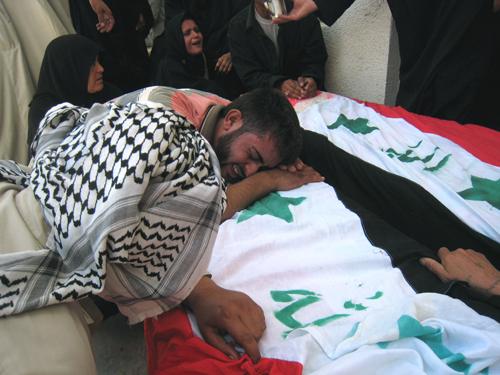American, Iraqi forces clash with several militant factions

Relatives mourn those killed in overnight clashes in the city of Amarah in southern Iraq, during a funeral in the holy Shiite city of Najaf on Monday. Alaa al-Marjani, The Associated Press
June 19, 2007
BAGHDAD – U.S. and Iraqi forces launched attacks on Baghdad’s northern and southern flanks to clear out Sunni insurgents, al-Qaida fighters and Shiite militiamen who had fled the capital and Anbar during a four-month-old security operation, military officials said Monday.
A top U.S. military official said American forces were taking advantage of the arrival of the final brigade of 30,000 additional U.S. troops to open the concerted attacks.
“We are going into the areas that have been sanctuaries of al-Qaida and other extremists to take them on and weed them out, to help get the areas clear and to really take on al-Qaida,” the senior official said on condition of anonymity because he was not authorized to speak about the operation. “Those are areas in the belts around Baghdad, some parts in Anbar province and specifically Diyala province.”
Al-Qaida has proven to be an extremely agile foe for U.S. and Iraqi forces, as shown by its ability to transfer major operations to Diyala’s provincial capital of Baqouba from Anbar province, the sprawling desert region in western Iraq. There is no guarantee that driving the organization out of current sanctuaries would prevent it from migrating to other regions to continue the fight.
The death toll in sectarian violence Monday skyrocketed after a brief period of relative peace. At least 111 people were killed or found dead nationwide, with 33 bodies of torture victims showing up in Baghdad alone.
Get The Daily Illini in your inbox!
Well to the south, Iraqi officials reported as many as 36 people were killed in fierce overnight fighting that began as British and Iraqi forces conducted house-to-house searches in Amarah, a stronghold of the Shiite Mahdi Army militia.
The U.S. military issued a statement that said at least 20 people were killed in clashes with coalition forces. A spokeswoman for Britain’s Ministry of Defense said British soldiers played a supporting role to Iraqi security forces during the raid and fighting in Amarah. She spoke on condition of anonymity, which is ministry policy.
The operations on Baghdad’s flanks were opened by the U.S. 3rd Infantry Division, which has taken over dangerous al-Qaida-infested regions to the south. The division began its drive into the Salman Pak and Arab Jabour districts on the city’s southeastern fringe over the weekend.
At the time, ground forces commander Lt. Gen. Raymond Odierno said U.S. troops were heading into those areas in force for the first time in three years.
The military said in a statement Monday that fighter jets dropped “four precision-guided bombs” in support of 1,200 U.S. soldiers from the 3rd Infantry as they started moving on al-Qaida targets.
Military officials said Multi-National Division-North forces likewise were increasing pressure on al-Qaida sanctuaries northeast of the capital in the verdant orange and palm groves of Diyala, now one of the most fiercely contested regions in Iraq.
The province is a tangle of Shiite and Sunni villages that has played into the hands of al-Qaida and allied militants who have melted into the tense region and sought to inflame existing sectarian troubles.
Al-Qaida has conducted public executions in the Baqouba main square and otherwise sought to enforce an extreme Taliban-style Islamic code.
AP correspondent Kim Gamel contributed to this report from Baghdad






